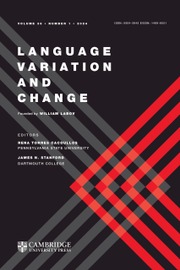Article contents
Irregular plurals in Brazilian Portuguese: An exemplar model approach
Published online by Cambridge University Press: 20 June 2011
Abstract
This paper discusses a group of Brazilian Portuguese plurals that end with the nasal diphthong [–ão] in their singular form. When pluralized, these words can take three plural forms: [–ões], [–ãos], or [–ães]. Each of these words has an etymological source that defines which morpheme should be applied to the plural form. However, in some cases, a different plural form is used instead of the etymological one. A set of psycholinguistic experiments was carried out with Brazilian Portuguese speakers. The goal was to analyze whether token or type frequency affects the choice of plural form for these words. The results show an interaction between type and token frequency, in the sense that type frequency serves as the basis for analogy, and token frequency can determine which words will be affected by the variation.
Information
- Type
- Research Article
- Information
- Copyright
- Copyright © Cambridge University Press 2011
References
REFERENCES
- 4
- Cited by

